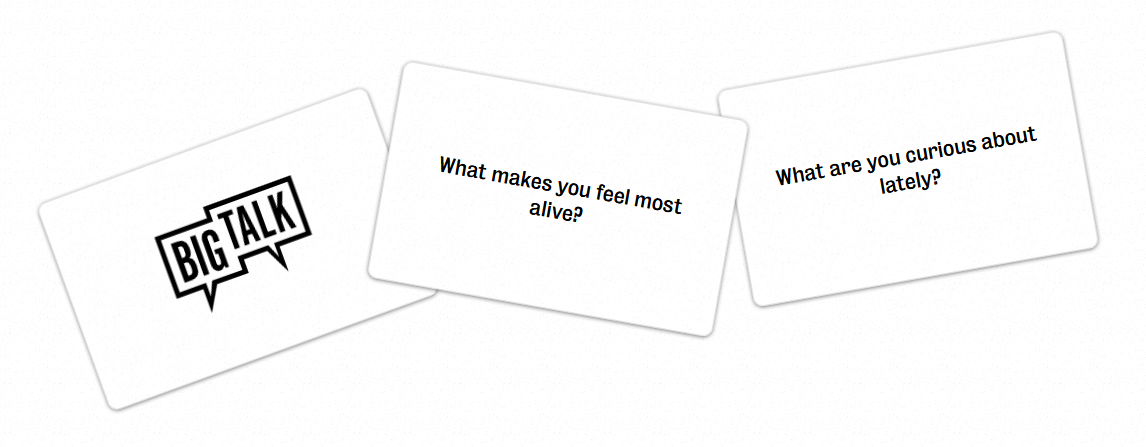Big Talk is a question card deck developed by Kalina Silverman about eight years ago. I played some questions from the Love, Self, and Original decks in the app with my partner.
Like many other getting to know you games that have come out recently, Big Talk tries to sell itself on having questions that make you think hard about yourself or others in the room. Unfortunately for Big Talk, it falls short of the many other options that are out there. Instead of being a deck of questions that inspire deep thinking, connection, and further questions, they felt like a questionnaire in the back of a magazine, inspiring what I would consider “fake deep” thought, at least among close friends or family. This is where you can say a lot of words about the topic, and without too much more thought it seems deep, but upon further investigation, the answer is obvious or doesn’t have as much substance as it seems. This likely stems from the fact that there’s no lead up into the questions. For example, We’re Not Really Strangers has several levels of depth to their questions, with the ‘small talk’ type questions early on.
While I think the designer of this game had good intentions and is correct that today’s society is lacking intimacy in so many aspects of our life, I’m just not convinced that we can completely “skip the small talk, and talk about the things that really matter in life.” As much as I also dislike having to ask other college students what their major, year, and hometown are when I meet them, it’s a base set of information that grounds everything else I know about them. Without this information, how do I trust that what they tell me is truthful, or that they won’t judge my own responses?
In playing this I also ran into a game play struggle: who goes first? It’s easy enough as a designer to say “oh they’ll figure it out, it doesn’t really matter who goes first,” but adding barriers to speaking in an already vulnerable situation is not a great plan. While playing in the app, there were no instructions as to how to play, you just tap into the deck and it gives you a question. Doing the dance of “wait are you going first or am I,” isn’t that big of a problem for my partner and I, but even then, it was a bout of awkwardness that felt coincidental and inhibited the goal of the game.
With all that said, Big Talk still does have questions that will make you think about topics that you may not have considered, and apply them to your current situation. For example, one of the questions I was asked was “What do I miss from my childhood and how can I bring that back into my life?” I occasionally reminisce about my childhood, but rarely do I think about how I could bring elements that I enjoyed into my current life. Upon further thought though, I was able to contextualize an abstract longing for a ‘simpler time’ and ground it in an actual activity that I’d like to do again (I climbed a lot of trees as a child and I kind of miss getting scraped up but being up there and squishing myself between branches to be stable).
All in all, Big Talk is a useful tool for getting to know others, but probably is best for people that already have a foundation of trust in their relationship, and are able to jump right into the deep stuff. For complete strangers, I’d argue for picking up a game that has more of a soft lead into baring your deeper truths.



